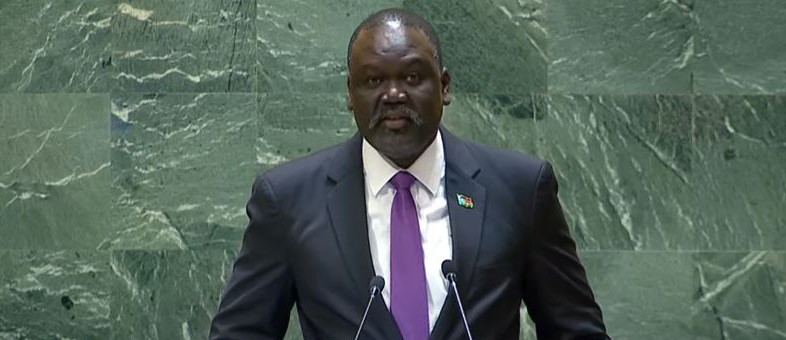South Sudan’s Minister for Foreign Affairs and International Cooperation said despite progress in his country’s quest for lasting peace and political stability, a scarcity of resources has posed a challenge to the full realization of the 2018 revitalized peace agreement.
Ramadhan Abdalla Mohammed Goc who was addressing the UN General Assembly on Wednesday, said that nevertheless, all parties to the peace accord are committed to consolidating the gains achieved so far as seen in the recent consensus to extend the general elections by 24 months to afford essential security sector mechanisms and elections-related institutions more time to fulfill their mandate.
He called on the international community to ensure that “this new road map for a peaceful transition in South Sudan is met by availing the required financial and technical support for the process.” Highlighting the Sudan conflict and its humanitarian fallout with over 800,000 refugees having fled to his country, he requested the global community to ramp up support for Sudan as well as efforts to resolve the conflict.
Emphasizing the devastating effects of climate change in Sudan and on the African continent, he called for increased efforts towards adaptation, strongly urging developed countries “to exercise greater leadership by expanding their financial contribution to the required global mitigation and adaptation interventions, as trillions of dollars are needed annually to tackle the crisis and restore trust in the multilateral system.”
Minster Abdalla enumerated women and youth inclusion, healthcare universality, affordability, and education transformation as key objectives of his Government. He lamented the existing Security Council sanctions and arms embargo on his country despite its and the African Union’s call that they be lifted, describing them as major impediments to South Sudan’s full realization of sustainable peace and security.
“As a country, we have experienced relative peace and stability for the last six years, and the continued imposition of these punitive measures is not reflective of the progress we have made so far,” he said. He proceeded to call for Security Council reform to make the 15‑member organ fit for purpose in “today’s global dynamics and realities”. It should also be expanded to properly accommodate Africa’s concerns.




